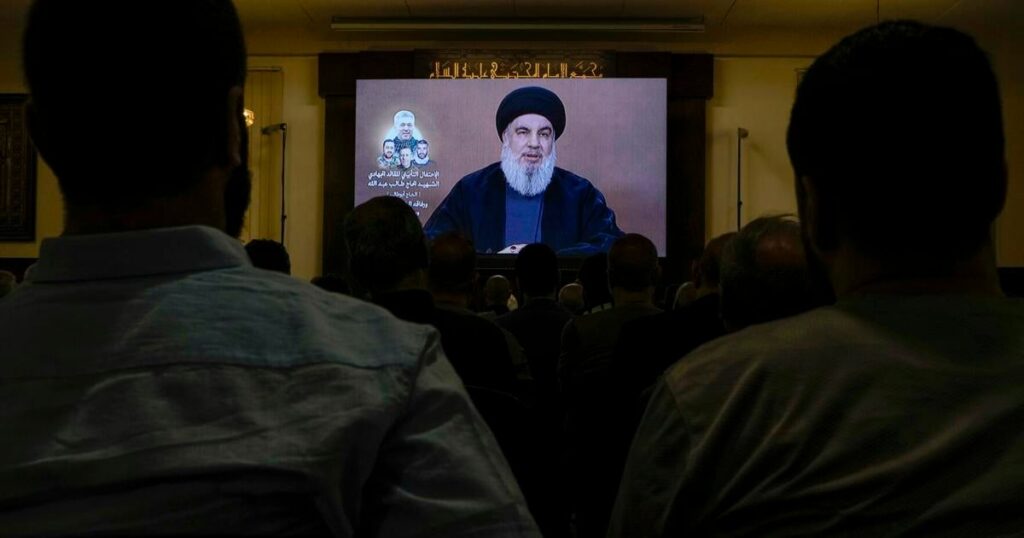BEIRUT (AP) — Lebanon's Hezbollah has new weapons and intelligence capabilities that could help it attack more key positions inside Israel in the event of all-out war, the group's leader warned Wednesday.
Hassan Nasrallah's comments came as a cross-border conflict between Hezbollah and Israel that has been simmering for months is reaching a boiling point and came a day after a senior US envoy met with Lebanese officials in the latest attempt to ease tensions.
“We now have new weapons, but I won't say what they are,” he said in a televised address mourning a top Hezbollah commander killed by an Israeli air strike in southern Lebanon last week. “Once a decision is made, they will be seen on the front lines.”
Hezbollah used a domestically produced explosive drone for the first time since the war between Israel and Hamas began in the Gaza Strip last October, as well as surface-to-air missiles against Israeli jets.
Nasrallah said in 2021 that Hezbollah had 100,000 fighters but now insists the number is much higher, without giving details. He also said he had rejected offers from regional allies and militias that could add tens of thousands of fighters to Hezbollah.
The roughly 10-minute video, purportedly shot by a Hezbollah surveillance drone and released on Tuesday, shows parts of the city of Haifa, far from the Israeli-Lebanese border. Nasrallah said in a speech on Wednesday that Hezbollah has more footage, posing a clear threat that it could reach its base deep inside Israel.
Israeli Lt. Gen. Helgi Halevi, visiting Israeli air defense soldiers near the Lebanese border on Wednesday, said Israel is aware of Hezbollah's capabilities shown in the video and has solutions to these threats.
“Our adversaries only know a fraction of our capabilities, and they will know it when they need it,” he said.
Hezbollah, an ally of the Palestinian group Hamas, has been exchanging near-daily attacks with Israel since the war in Gaza erupted on October 7, aiming to force Israeli troops out of the embattled Gaza Strip.
Hezbollah attacks have intensified since Israel expanded its offensive on the southern Gaza city of Rafah last month, and intensified further last week when an Israeli strike killed a senior Hezbollah commander, Taleb Sami Abdullah, the most senior soldier killed so far in the Israel-Hamas war.
The Israeli military also said on Tuesday it had “approved and verified” plans to attack Lebanon, but the decision on whether to actually launch such an operation must be taken by the country's political leaders.
The warnings from both sides came following a visit by Amos Hochstein, a senior adviser to President Joe Biden, who met with Lebanese and Israeli officials this week in the latest effort to ease tensions. Hochstein told reporters in Berlin on Tuesday that this was a “very serious situation” and that a diplomatic solution to prevent a larger war was “urgent.”
Nasrallah said a broader war with Lebanon would have regional repercussions and that Hezbollah would attack other countries in the region that support Israel, citing Cyprus as an example of the country hosting Israeli military training exercises.
Only a ceasefire in Gaza would halt fighting on the Lebanese-Israeli border or attacks on Western- or Israeli-linked targets by Houthi rebels in Yemen and Iraqi militias allied with Hezbollah.
Israel sees Hezbollah as its most direct threat, and the two countries fought a 34-day war in 2006 that ended in a stalemate. Hezbollah's military capabilities have grown significantly since then, and the United States and Israel estimate that the group, along with other Lebanese factions, has about 150,000 missiles and rockets. Hezbollah is also working on developing precision-guided missiles.
Hezbollah said at least four of its fighters were killed in Israeli attacks on Wednesday, as Hochstein returned home for new meetings in Israel.
Lebanese state media reported the attacks took place along the border and near the coastal city of Tyre, about 30 kilometers (19 miles) away. The Israeli army said two Hezbollah launches damaged several vehicles in northern Israel.
Kamel Mohanna, head of the Amer Association, an NGO that provides medical services in different parts of Lebanon, said that its medical center in the town of Khiam had been hit and damaged by Israeli shelling.
Israeli attacks have killed more than 400 people in Lebanon, mostly Hezbollah and other fighters, but also more than 80 civilians and non-combatants. In northern Israel, attacks from Lebanon have killed 16 soldiers and 11 civilians.
Associated Press writers Melanie Lidman and Yosef Federman in Jerusalem contributed to this report.
Copyright 2024 The Associated Press. All rights reserved. This material may not be published, broadcast, rewritten or redistributed without permission.



